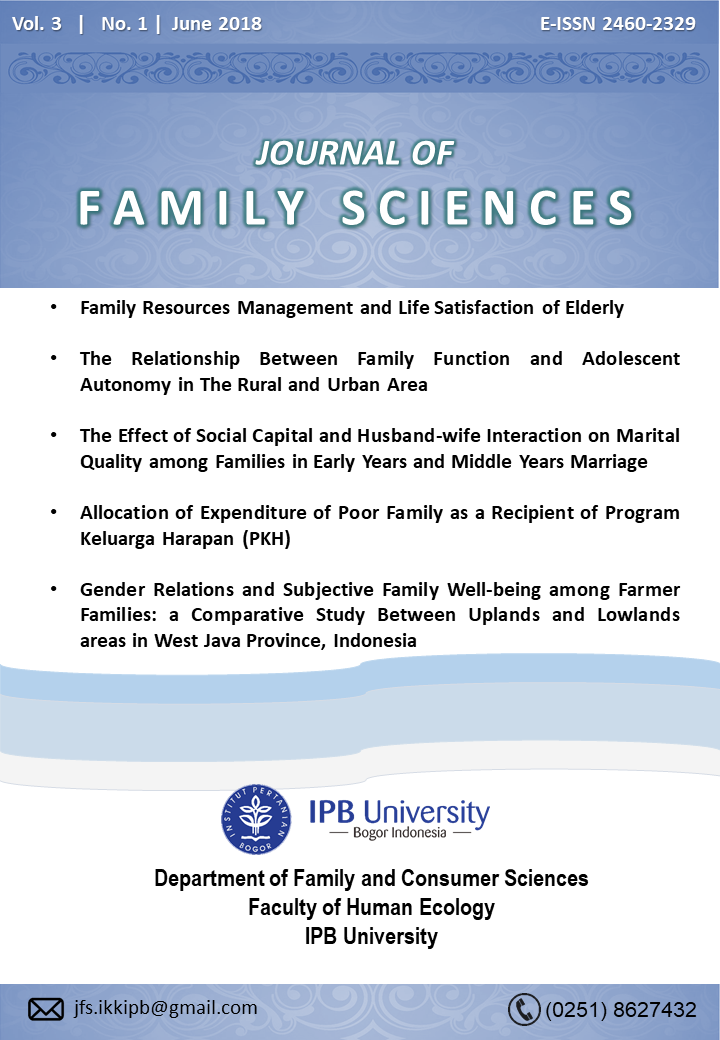Allocation of Expenditure of Poor Family as a Recipient of Program Keluarga Harapan (PKH)
Abstract
The aim of this article is to examine the allocation of expenditure for low-income families after receiving the Program Keluarga Harapan (PKH) or Conditional Cash Transfer (CCT). Combination of cross-sectional and retrospective designs were applied in this research. Data collection locations were carried out in eight villages in Dramaga District, Bogor Regency. The research sample was determined randomly (probability sampling) used a systematic method and obtained a study sample of 150 CCT recipient families. Data was processing used descriptive statistics. The CCT funding eligible for the family who has school-age children, toddlers, nursing mother, and pregnant woman. The CCT funds are spent by families with an average range of two weeks. The beneficiary of PKH significantly improving the quality of education and health, increasing the amount of family savings, and family income. The allocation of CCT funds more than half is used for human investment. However, in the allocation of CCT funds, there are still families who use PKH funds for non-educational activities such as food/household needs, pay-off debt, saving, electricity payment, and business capital.
Downloads
References
Behrman, J, Hoddinott, J. (2000). An evaluation of the impact of Progress on pre-
school child height. International Food Policy Research Institute,
Washington, DC. http://ideas.repec.org/p/fpr/fcnddp/104.html.http://
www.ifpri.org/themes/progresa/pdf/Gertler_health.pdf [18 September
.
Gertler, PJ. (2000). Final report: The impact of Progress on health. International
Food Policy Research Institute, Washington, D.C. http://www.ifpri.org/
themes/progresa/pdf/Gertler_health.pdf [18.
Hutagalung, SA., Sirojuddin, A., & Widjajanti I.S. (2009). Problems and
Challenges for the Indonesian Conditional Cash Transfer ProgrammeProgram
Keluarga Harapan (PKH).' SMERU Working Paper Issue 4
Jakarta: The SMERU Research
Irmayani, & Nainggolan, T. (2015). Perilaku Coping Penerima Program Keluarga
Harapan (PKH) Menjelang Exit Program Di Jakarta Utara. Sosio
Konsepsia, 4(3), 177-193.
Kholif, KI., Noor, I., & Siswidiyanto. (2014). Implementasi Program Keluarga
Harapan (PKH) dalam Menanggulangi Kemiskinan di Kecamatan
Dawarblandong Kabupaten Mojokerto. Jurnal Administrasi Publik, 2(4),
-714.
Miftahuddin. (2011). Analisa Karakteristik Rumah Tangga Miskin dengan
Metode Regresi Logistik Terbaik. Jurnal Matematika, Statistika, &
Komputasi, 7(2), 79-91.
Rozi, U. (2011). Implementasi Program Keluarga Harapan di Kabupaten Tanah
Laut. Cocus,1(2), 49-80.
Puspitawati H, Herawati T, Sarma M. (2008). Dampak Subsidi Langsung Tunai
(SLT)- BBM pada Kesejahteraan Keluarga Miskin Di Bogor, Jawa Barat.
Jurnal Ilmu Keluarga dan Konsumen.1(1): 1-15.
Soares, FV., & Silva, E. (2010). Conditional Cash Transfer Programmes And
Gender Vulnerabilities: Case Studies of Brazil, Chile and Colombia.
Working Paper number 69, September 2010, International Policy Centre
for Inclusive Growth.
Stampini, M., & Tornarolli, L. (2012). The Growth of Conditional Cash Transfers
in Latin America and the Caribbean: Did They Go Too Far?. Policy Paper
IZA, 49, 1-30.
Suntiana, L., Kanto, S., & Soenyono. (2015). Rancangan Model Kebijakan
Penanggulangan Kemiskinan Dalam Perspektif Pemberdayaan Perempuan
(Kajian Terhadap Implementasi Program Keluarga Harapan di Kecamatan
Sumberbaru Kabupaten Jember). Wacana, 18(3), 146-157.
[TNP2K] Tim Nasional Percepatan Penanggulangan Kemiskinan. Program
Keluarga Harapan: Upaya Memutus Rantai Kemiskinan. (tersedia pada)
http://www.tnp2k.go.id/images/uploads/downloads/Fact-sheet-PKH2015_Juni-1.pdf
Utomo, D., Hakim, A., & Ribawanto, H. (2014). Pelaksanaan Program Keluarga
Harapan Dalam Meningkatkan Kualitas Hidup Rumah Tangga Miskin :
Studi Pada Unit Pelaksana Program Keluarga Harapan Kecamatan
Purwoasri Kabupaten Kediri. Jurnal Administrasi Publik, 2(1), 29-34.
Authors who publish with this journal agree to the following terms:
- Authors retain copyright and grant the journal right of first publication with the work simultaneously licensed under a Creative Commons Attribution 4.0 International License that allows others to share the work with an acknowledgement of the work's authorship and initial publication in this journal.
- Authors are able to enter into separate, additional contractual arrangements for the non-exclusive distribution of the journal's published version of the work (e.g., post it to an institutional repository or publish it in a book), with an acknowledgement of its initial publication in this journal.
- Authors are permitted and encouraged to post their work online (e.g., in institutional repositories or on their website) prior to and during the submission process, as it can lead to productive exchanges, as well as earlier and greater citation of published work (See The Effect of Open Access).



_001.png)



